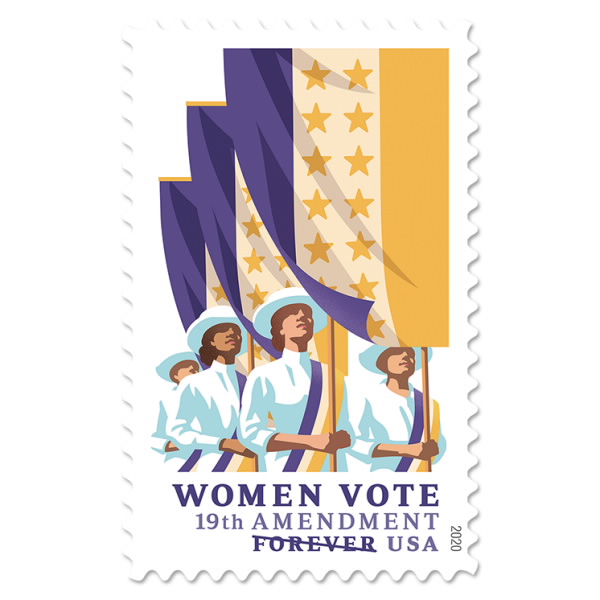Today is the centennial of the ratification of the Nineteenth Amendment. Yes, on August 18, 1920, the Nineteenth Amendment was ratified, which established at the national level the right of women to vote.
The young women of today, free to study, to speak, to write, to choose their occupation, should remember that every inch of this freedom was bought for them at a great price.
– Abigail Scott Duniway (1834-1915) women’s rights advocate, newspaper editor and writer
In last year’s post on this topic, I talked about coverture – how women basically ceased to exist legally once they were married. The argument against women’s suffrage seems to always come back to an opposition of women’s participation in public life. This pernicious and spurious argument was nothing new in western culture, having roots at least as far back as Ancient Greece.
The more that I learn about the woman suffrage movement, the more nuance I discover and the more fascinated I become. The fact that it took over SEVENTY years for something that seems to be inarguable to be ratified. The impact of the Reconstruction era on the movement. That five other amendments to the Constitution were ratified in the meantime. The part about how President Woodrow Wilson basically only got behind the movement in order to save face in the WWI peace process. There’s so much. In an attempt to keep this post at a reasonable length, I am going to focus on two key periods.
The Civil War and The Reconstruction Documents
The Civil War (1861-1865) had a huge impact on the woman suffrage movement. The movement had begun organizing in the 1840’s and established itself with the Seneca Falls Convention of 1848. Prior to the Civil War suffragists and abolitionists collaborated on their common goal – the citizenship of and full legal status of their people. There was a sort of optimistic attitude that both Black people and women would gain the vote together. This did not happen, and I believe that excluding women from the vote through the reconstruction documents has exacerbated and entrenched gender/race rifts that we continue to experience.
The Thirteenth, Fourteenth, and Fifteenth Amendments are known as the reconstruction documents. While intended to establish citizenship and rights for Black people, these documents also serve to institutionalize the disenfranchisement of women.
The Thirteenth Amendment ostensibly abolishing slavery was ratified on December 6, 1865.
The Fourteenth Amendment was ratified on July 9, 1868. The citizenship clause of this amendment states that, “All persons born or naturalized in the United States, and subject to the jurisdiction thereof, are citizens of the United States and of the State wherein they reside.” This establishes that women as well as Black people are citizens. However, the privileges and immunities clause states, “But when the right to vote … is denied to any male inhabitants …” – this is the first time that gender is mentioned in the constitution and by its specificity, it implies that the right to vote may be denied to women.
While the Fifteenth Amendment (ratified in 1870), states that the right to vote, “shall not be denied … on account of race, color, or previous condition of servitude,” was intended to clarify the intent of the Fourteenth Amendment, it also specifically excludes sex as a criteria, serving to further institutionalize the disenfranchisement of women.
World War I and Votes for Women
World War I was a huge factor in the movement for women’s suffrage gaining some traction. With millions of American men being deployed overseas, women stepped into many of abandoned roles. The suffragists took advantage of the PR opportunity.
President Woodrow Wilson had been opposed to suffrage. However, when justifying the U.S. participation in WWI on the grounds of making, “the world safe for democracy,” the hypocrisy of excluding half of the nation’s citizenry from participation in the political process could no longer be ignored. Wilson came to realize the necessity of enfranchising women if for no other reason than to save face on the world stage.
One way that we see the effect of reconstruction as an impediment to the woman suffrage movement during WWI is in the complete refusal of southern democrats to support the issue. In fact, the Nineteenth Amendment did not pass the Senate until after the democrats lost the majority in the 1918 election. It was finally able to pass the Senate in the summer of 1919 (it had passed the House five times). Then it was off to the states for ratification. In the end, Tennessee held the deciding vote and on August 18, 1920, after multiple postponements, the Tennessee legislature voted for the amendment … by one vote.
“The right of citizens of the United States to vote shall not be denied or abridged by the United States or by any State on account of sex.”
the Nineteenth Amendment to the Constitution of the United States of America
Coda
In the 1920 presidential election, in which Republican Warren G. Harding defeated Democrat James M. Cox (Wilson had already served two terms), only one third of the women who were now eligible to vote did.
The Nineteenth Amendment was ratified one hundred years ago. But have women made advances in public life commiserate to their percentage of the population? Maybe not. The pernicious bias against women’s participation in public life persists. Like Abigail Scott Duniway, I hope that women today realize that their ability to choose how they participate in public life was the result of a long, hard fought battle. I hope they realize that the war for equality has not been won and that they stay ever vigilant in asserting their rights as full-fledged members of the human race.


I watched the PBS documentary about Sufferage and got all fired up.
Thanks for putting this together. I am going to watch the PBS special too.
A Tennessee representative, Burns, got a note from his Mom telling him to be the vote that would ratify the 19th Amendment. Always listen to Mom.
Cynthia, Thank you for always reminding us that tradition, cultural biases, and limiting belief systems still exist today. There will always be political movements, ignored, ineffective laws, and misinformation and education that demands us to educate, stimulate, and be vigilant about all of the Sheroes who came before us. Let’s celebrate those who came before us by educating and reminding the new generation of women about their sacrifices that gave us our right to vote, which reflects our lifestyles today. I am grateful for you, a modern-day Shero with a brilliant and powerful voice!!!
Professor Gellis
this is indeed, all important to remember! I am impressed with the accuracy and the detailed information. We need to be aware that the vote wasn’t won without a long and determined fight, spanning generations. I expect that I will be reading more of your blogs, Cynthia. Thank you so much for choosing to write about this. Although, I have to say, from my perspective, women have come a long, long way, and have made substantial changes and contributions to every strata, every facet of our world.